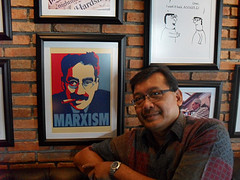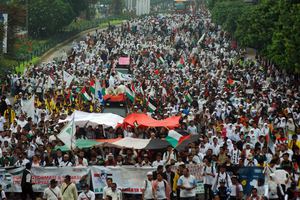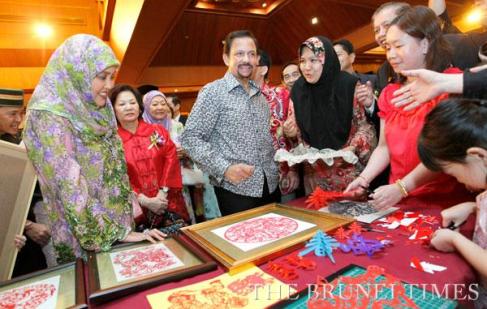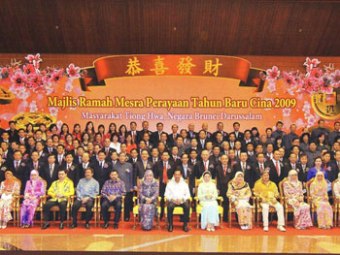السلام عليكم ورحمة الله وبركاته
الحمدالله رب العالمين ، وأصلى واسلم صلاة وتسليما يليقان بمقام
أمير الأنبياء وإمام المرسلين. أَمَّا بَعْدُ.
In the Audience of His Majesty Duli Yang Maha Mulia Paduka Seri Baginda Sultan Haji Hassanal Bolkiah Mu‘izzaddin Waddaulah Ibni al-Marhum Sultan Haji Omar Ali Saifuddien Sa‘adul Khairi Waddien, Sultan and Yang Dipertuan of Brunei Darussalam.
Begging your pardon your Majesty,
With deep respect, your loyal subject seeks permission to fulfill the wishes of the Knowledge Convention Steering Committee and present the Inaugural Lecture at this convention. Your loyal subject also seeks permission to use the common language throughout this presentation.
Respected audience,
The topic given to me was in fact the theme of this Convention itself i.e.: “The Shari‘ah Criminal Law Ensures Justice And Security For Everyone.”
Indeed, there can be no doubt that the criminal law created by Allah guarantees justice for everyone and safeguards their well-being. Why is this so?
This is so because that is what Allah has determined, His Laws are for all, they are all-encompassing and ensure justice and security for everyone – Muslims or non-Muslims – everyone is protected by His Laws. The dzimmi, non-Muslims living in a Muslim territory, are never to be hurt, they are not to be tyrannised or persecuted by anyone; to do so is a sin. The Prophet Šallallâhu ‘alaihi wasallam has said:
مَنْ أَذَى ذِمّياًّ فَأنَاَ خَصْمُهُ، وَمَنْ كُنْتُ خَصْمَهُ خَصْمَتُهُ يَوْمَ الْقِيَامَةِ
Meaning: “Whoever harms a dzimmi, I am his enemy, and whoever makes me his enemy, verily he is my enemy on resurrection day.”
In fact, the Laws of Allah also extend to creatures other than man, safeguarding their interests and well-being too.
When the Prophet Šallallâhu ‘alaihi wasallam narrated about a man who had scooped up some water from a well in order to give a thirsty dog a drink, the companions asked: “Do we humans get rewarded for helping animals O Rasulullah”? The Prophet replied:
فِي كُلِّ كَبِدٍ رَطْبَةٍ أَجْرٌ (رواه البخاري ومسلم)
Meaning: “(Yes) there is a reward for every one with a moist liver (animal); if we help, we will be rewarded for it.”
This was the reason Sayyidina ‘Umar Radhiallâhu ‘anhu became angry with a person for overloading his camel with a heavy burden. He had also wept upon seeing underfed sheep that had become emaciated.
Thus is the mercy of Islam my friends! So wide and all-encompassing are the Laws of Allah for the good of the whole universe.
This world is replete with crime. Crime can cause anxiety and fear, it can rob us, and our country, of peace; crime can cause unrest that may then lead to the loss of honour and lives.
That is the nature of crime.
So what is Islam’s response to crime? What is the position of Allah towards crime?
The response from Islam is: Crime is a form of sin and whoever commits crime is punished. Meanwhile Allah has resolved that all punishments must be in accordance with His Laws. The person who punishes with other than His Laws is labeled “al-Kâfirûn”, for He says: ( : فَأُولۤئِكَ هُمُ الكَافِرُوْنَ They are unbelievers) and “azh-Zhâlimûn”, for He says: (فَأُولۤئِكَ هُمُ الظَّالِمُوْنَ : They are oppressors/who are cruel) and “al-Fâsiqûn”, for He says: ) فَأُولۤئِكَ هُمُ الفَاسِقُوْنَ : They are sinners).
The Laws of Allah are incomparable to any other law. The Laws of Allah are full of wisdom and replete with secrets – with divine secrets. Wisdom and secrets are His, they belong to Him and as the Owner of wisdom and secrets it is impossible that Allah is mistaken, it is impossible for Allah to err in the creation of His Laws.
These are the Laws of Allah. They are stable, they never change. Indeed they do not need to change because their creator is not man but Allah Himself, who is Most Wise and All-Knowing of the requirements of the laws for us human beings.
Unlike us, who are weak, we create laws that last for only a year or two, or at the very most several decades, after which they change. Laws that are constantly changed and amended, even discarded, such as the “death penalty” for example, which was enforced once. Today, the more developed we are, the more disordered our thinking have become so much so that in 2007 the United Nations, yes, the United Nations, had obtained a “majority vote” to abolish the death penalty worldwide.
Look! This is us human beings but with Allah it is different. He has never wavered with the death penalty (Qišâš). It has been more than 1400 years since al-Qur’an was sent down yet the death penalty had never been withdrawn. It continues to persist and inshâ Allah it will continue till the end of time. Allah Ta‘ala says:
Translated: “O ye who believe! Retaliation is prescribed for you in the matter of the murdered. ” (البقرة: ١٧٨)
What is the rational, what can be the “great excuse” for abolishing the death penalty? People say on humanitarian grounds. The death penalty is cruel, inhumane and therefore it must be abolished.
Is that all? Yes, that is all.
Now it is our turn to ask: Where is the superiority of your rational: Compassion for the murderer but not for the murdered? Sympathising with the victimiser but not with the victim? Let’s say the victim was a husband, where is your sympathy for his wife, who has become a widow? And where is your sympathy for his children, who have become orphans? Where is your balance of justice? Is this fair – sympathising with the murderer and ignoring the murdered victim? You feel sorry for the murderer’s family more than you do for the murdered victim’s family? What justice is this; where is the logic and the superiority of such a law?
Many people only see the “death” in the Shari‘ah Criminal Law but Allah says: وَلَكُمْ فِي الْقِصَاصِ حَيَّاة (within the qišâš retribution) there is life for you.
What does this guarantee of life mean here? It means that the effect of the penalty, if enforced, is that people will be afraid to become murderers, because if they kill, they will be killed. Therefore, if everyone does not want to kill for fear of the qišâš penalty, under which they will also be killed, does this not mean then killings will not occur? And if killings do not occur, does it not mean that lives will be safe and living will continue in society. Sadaqallâh al-Azhim. Most True is Allah Who has said: وَلَكُمْ فِي الْقِصَاصِ حَيَّاة.
Imagine if the death penalty is abolished, is it not the same as encouraging people to kill? There is nothing to fear anymore because if a person kills, his punishment is not death. Yes, who indeed will fear if the penalty for murder is merely a fine or an imprisonment? No one.
This is why we were very shocked to read that recently, in one of the countries in Latin America, more than 60,000 murders are committed in a year. 60 thousand, not 6 thousand but 60 thousand people are murdered per year!
Why? Why are there such a great number of people murdered in that country? We have yet to find the answer. Is it possibly due to the fact that the death penalty has been abolished there? If so then it proves that the decision to abolish the death penalty is not a step forward rather it is a shift backward in man’s thinking.
It appears that there is a tendency in today’s legislation to lighten the punishment even for such a serious crime as gang rape. This criminal activity is common and has recently occurred in a country, about a year ago, whereby six men had raped a student in a bus and ultimately caused her death. One of the rapists had committed suicide in prison while another was merely given a three-year jail sentence. Meanwhile, for the remaining four, after the citizens of the country protested that the criminals should be given a punishment befitting the crime, on 3 September 2013, we read that all four rapists were finally sentenced to death. This verdict was received with loud claps and cheers by members of the public that had crowded the Court at that time.
This incident is an illustration of man-made laws – one moment it is like this the next moment it is like that. What is obvious is that there is a tendency to be lenient in prescribing punishment.
For no rhyme or reason Islam has now been accused of being cruel. The Laws of Allah are considered irrelevant, harsh, inhumane and frightening.
In fact there are those who try to create trouble: “If Brunei implements its Shari‘ah Criminal Law then should we not worry that tourists may not come to Brunei for fear of their hands being cut?”
Astagfirullâh!
All right then, please listen to our answer: “Sir, do all potential tourists to Brunei plan to steal? If they do not then what do they need to fear? Believe me when I say that with our Shari‘ah Criminal Law everyone, including tourists, will receive proper protection; inshâ Allah, they will not be disturbed; inshâ Allah, their honour is safeguarded; inshâ Allah, their money is also guaranteed safe and inshâ Allah even their lives are safe.”
With the permission of Allah and with His mercy, this will come true.
This is not mere rhetoric! There are proofs. Allow us to illustrate: Long ago there were a lot of thefts, robberies and murders in the Hijaz Arabian Peninsula. Even the hajj pilgrims were not spared, they were attacked and robbed. But, after the Saudi Government implemented their Shari‘ah Criminal Law, crimes of thefts and burglary subsided. People were safe and free from thefts and robberies.
Now, who says people are afraid to go to Makkah? Who says tourists are afraid? No they are not! Every year, thousands of hajj pilgrims inundate Makkah, their numbers reaching two or three million, forcing the Saudi Government to limit the issuance of their quotas so as to control the deluge.
Who can deny this? Do you know, do you realise that this is what is called “barakah”, it is a sign that there is barakah [blessings] there. The Laws of Allah is not void, it is full of barakah. The Laws of Allah is not void, it is full of wisdom. We Bruneians have faith, we believe in barakah. Our King has faith and believes in barakah¸ and all of us Alhamdulillâh, have faith and we believe in barakah.
O mankind, fear not the Laws of Allah for Allah never errs as we err. Allah never ever forgets as we forget. Allah is never ever wrong as we are wrong. Therefore, do not doubt His Laws. Who are we to doubt the Laws of Allah? Yes indeed, Allah Himself has created His Laws for us, we should in fact be grateful and be thankful.
Let us not just look at the hand-cutting or the stoning or the caning per se but let us also look at the conditions governing them. It is not indiscriminate cutting or stoning or caning, there are conditions and there are methods that are just and fair.
It is perhaps appropriate for us to quote an example of caning here. The caning penalty is found in both legislations: Civil and Shari‘ah. Let us look at the difference between the civil caning and the shari‘ah caning.
A Prison Director has once revealed, which was reported in the Straits Times issue 13.9.74 and later quoted by the writer Kamaluddin bin Jamit in the magazine Dian Digest No: 159, published in June 1984, that the caning penalty in the civil criminal law leaves a mark and causes lifelong humiliation.
Under the present Prison Regulations caning is done only on the offender’s buttocks. Officers carrying out the punishment are carefully selected from among those who are big-sized, well-built, highly qualified self-defence personals. They are equipped with a cane that is ½ an inch thick and 4 feet long. During the caning, the warder does not only use the strength from his hand but also his whole body weight as well. As a result, the skin on the buttocks of the caned person will rip open after just three lashes, and the buttocks will be covered with blood. Usually, the offender will faint after the first three or four lashes.
Imagine if the lashes are tens of times or let us take the minimum 10 times; how many times will the offender faint, if he does not die?
The caning penalty is conducted in private. The offender will be stripped naked or dressed in only a piece of loincloth to cover the front; his ankles and hands tied to a wooden frame. This frame is ‘H’ shaped with the legs three feet apart. It is crucial to use a strong rope to secure the offender because usually, due to the great pain, the caned offender will shake and tremble violently.
This is caning under man-made law, which aims solely to punish and to torture the offender, as retribution for the crime committed.
It is very different from the caning penalty under the Shari‘ah Criminal Law. Under this law, the caning is more of a “spiritual therapy”, to teach and educate the soul so as to be humble and to repent. The lesson is not just for the offender alone but also for the rest of the society. This is the wisdom behind why shari’ah punishment is carried out in the open, unlike under the civil criminal law, where it is hidden and concealed.
Apart from evoking a sense of shame in the offender, this method of punishing in the open also leaves an impact on the society, which will heed the lesson of how humiliating, how painful and how embarrassing it is to be a criminal offender. Therefore those who have witnessed this punishment will surely be more careful and more afraid of committing a similar crime.
There is hardly any mercy in the civil criminal law. Everything is simply harshness and ruthlessness: the bounding, stripping naked and caning until the subject faints and is drenched in blood. Meanwhile, to ensure that the caning instrument does not break upon striking the offender’s buttocks, it is first soaked in water overnight before it is used.
Caning in Shari‘ah Criminal Law is different. Rasulullah Šallallâhu ‘alaihi wasallam had chosen an average cane, not too hard and not too soft. Sayyidina ‘Umar Radhiallâhu ‘anhu, someone who is well-known for being very strict in implementing justice, once reminded caners not to lift their hands to the extent of exposing their armpits while caning. In fact, according to a hadîth, the purpose of the caning is deemed to have been achieved by using the tip of a cloth or a handkerchief or a date stalk. If a date stalk is used, it must be of moderate size, not too old or too young. That is how shara‘ ruling has specified it.
Then there is the method of caning: It is not done with a hard swing of the hand, no! Rather, shara‘ says that it is sufficient for the hand to be raised slowly, not so high as to be above the head, and the lashes must be evenly distributed at the back, not on one spot only, as it is in the civil location that focuses only on the buttocks.
A little on how cases are handled. The Shari‘ah Criminal Law is very neat, very cautious and its conditions are very tight. Its method is very unique, refine and full of wisdom, for example in the case of zinâ there must be 4 witnesses and all four must be “‘âdil” [just]. What does ‘âdil mean? It is avoiding big sins and not committing small sins regularly. This is different from civil, which accepts whoever as a witness, including children and those who are fâsiq [sinners], even though they may clearly be sinful, they are still accepted as witnesses and their testimonies are adopted.
However, Shari‘ah Law does not accept, it does not accept these people, sorry! Regardless of how many of them there may be.
In order to understand how important witnesses are in a trial, let us look at this great incident which illustrates that justice is for all: How a Muslim judge does not discriminate, is not racist and is impartial in arbitrating between a Muslim and a non-Muslim.
An argument had ensued between Sayyidina ‘Ali bin Abi Talib and a poor Jew over an armour. ‘Ali had claimed that the armour was his while the Jew too had made a similar claim. Both had claimed the armour to be theirs.
The case was then brought to trial judged by judge, Shuraikh, who was appointed by Sayyidina ‘Umar, the Amirul Mu’minin.
Judge Shuraikh had asked ‘Ali to bring forth witnesses and so ‘Ali produced several witnesses, one of whom was his own son al-Hasan. Judge Shuraikh rejected al-Hasan as a witness for his father, saying to ‘Ali: “This is your son, bring forth another witness.” But ‘Ali could not produce another witness so judge Shuraikh resolved that the armour belonged to the Jew. ‘Ali lost the case solely due to a poor witness.
That was it! For the sake of justice, all of these are taken into consideration in the Laws of Allah Ta‘ala: The way a case is handled, the way it is resolved and the way punishment is carried out.
Related to the way a case is handled is the behaviour of the judge. In shara’, judges are not allowed to differentiate among those they are arbitrating, not even in terms of “seating”. The judge must seat them both in front of him, not both on his right or both on his left. If this happens then it means that one person will be nearer to the judge while the other will be further from him. Similarly, he should not seat one person on his right and the other on his left because the one on his right will surely feel that he is more honoured than his opponent and the one on the left will feel slighted and disrespected.
Sayyidina ‘Umar bin Al-Khattab and Ubai bin Ka‘ab were once in an argument over something and Zaid bin Thabit was arbitrating them. In court, Zaid gave a cushion to ‘Umar but not to Ubai. ‘Umar then said: “O Zaid, this is the beginning of your tyranny.” ‘Umar censured judge Zaid for giving him a cushion and not his opponent, Ubai.
Ah this was how the Laws of Allah were handled in court, very subtly, very neatly, absolutely clean and fair.
Similarly, before punishment is implemented all related matters are looked into, they are not neglected, as seen in this example:
Sayyidina ‘Umar Radhiallâhu ‘anhu was once approached by a pregnant woman who confessed to having committed adultery. Sayyidina ‘Umar had wanted to impose the penalty of 100 lashes but before the punishment could be carried out Sayyidina ‘Ali Karramallâhu wajhah appeared and said to ‘Umar: ويحك يا عمر، ويحك (Woe to you ‘Umar! Woe to you!). ‘Umar asked: “What is it ‘Ali? What is it?” Sayyidina ‘Ali replied:
كيف تجلدها وهي حامل؟ إن كان لك ولاية على جلد ظهرها، فليس لك ولاية على جلد ما في بطنها، إن ما في بطنها برئ ليس لك ولاية عليه، دعها حتى تضع حملها.
Meaning: “How can you cane this woman when she is pregnant? Even if you have the right to cane her back you do not have the right to cane the child that is in her stomach. It (the child) is clean, it is sinless. You have no right over it. Therefore free her until she delivers.”
The Supreme Judge, the Amirul Mu’minin was checked by ‘Ali, he was in fact advised by ‘Ali as to how to judge fairly – ‘Umar was advised by his friend, his subordinate.
What was ‘Umar’s response? Was ‘Umar willing to accept the comment or was he angry? Did he punish ‘Ali for being forward and for daring to correct him?
Let us look with the heart’s eye and let us listen to this paradise dweller. ‘Umar said:
لَوْلاَ عَلِيُّ لَهَلَكَ عُمَر. لَوْلاَ عَلِيُّ لَهَلَكَ عُمَرُ.
Meaning: “If there is no ‘Ali surely ‘Umar will perish. Without ‘Ali ‘Umar perishes.”
What does this mean? It means that ‘Umar accepted ‘Ali’s comment. He accepted ‘Ali’s advice. The Supreme Judge and the Amirul Mu’minin accepted ‘Ali’s advice, the advice of his subordinate. In fact not only did he accept the advice he had also openly declared that without ‘Ali, if it was not for ‘Ali, ‘Umar would surely perish. It is destruction for ‘Umar. What perishes, what is destroyed? It is destruction upon receiving punishment from Allah for having erred in implementing justice.
Do we see how these people of paradise are with the Laws of Allah Ta’ala? How they are with justice? Do we see this? They were extremely careful, they were not negligent and nothing stopped them from accepting advice, accepting correction and accepting suggestion for the sake of justice.
Who among the legislative leaders in today’s world can challenge the etiquette and nobility of our Muslim leaders ‘Umar and ‘Ali Radhiallâhu ‘anhumâ?
Begging your pardon your Majesty, this is the end of my Inaugural Lecture. Your humble servant seeks forgiveness for any unintentional error or impropriety. All that is good is from Allah, while the opposite is from your humble servant himself.
والله ولى التوفيق
والسلام عليكم ورحمة الله وبركاته
Honouring the bestowal.
The Brunei Times
Tuesday, October 22, 2013


*Inaugural lecture by State Mufti of Negara Brunei Darussalam at the Opening of Majelis Ilmu (Knowledge Council) Seminar and Exhibition themed ‘Islamic Penal Code (Jenayah), International Convention Centre, Berakas, Bandar Seri Begawan.
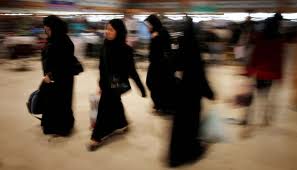 In the mid-1970s, along with the oil boom, Saudi Arabian government began to reform the education system. Traditional teaching and learning in the Grand Mosque and the Prophet’s Mosque transferred to universities with curricula and modern systems. In Medina, for example, there is the Islamic University of Madinah. Meanwhile, in Mecca there is University of Umm Al-Quro. The students who formerly had allowed from different backgrounds, in the modern education system all of the students have to pass the selection tests and received a scholarship from the Saudi Government.
In the mid-1970s, along with the oil boom, Saudi Arabian government began to reform the education system. Traditional teaching and learning in the Grand Mosque and the Prophet’s Mosque transferred to universities with curricula and modern systems. In Medina, for example, there is the Islamic University of Madinah. Meanwhile, in Mecca there is University of Umm Al-Quro. The students who formerly had allowed from different backgrounds, in the modern education system all of the students have to pass the selection tests and received a scholarship from the Saudi Government. This condition led to open wide employment opportunities for foreigners. Say it; construction workers, drivers, nurses, teachers/lecturers, to domestic helpers and other manual labor. So, crowdie foreign workers from various countries fluxed to Saudi, including from Indonesia. Both were recruited directly by the company/contractor and same come on their own. The latter usually comes to Saudi with Umrah or Hajj visa.
This condition led to open wide employment opportunities for foreigners. Say it; construction workers, drivers, nurses, teachers/lecturers, to domestic helpers and other manual labor. So, crowdie foreign workers from various countries fluxed to Saudi, including from Indonesia. Both were recruited directly by the company/contractor and same come on their own. The latter usually comes to Saudi with Umrah or Hajj visa. We too often hear the mistreatment suffered by domestic workers in Saudi. Say it; from physical, sexual abuse, unpaid salary and so on. Some of them then run away from their employer. Form a number of friends in Saudi; I sometimes get a pathetic story about bad luck experienced by maids who fled from their employers.
We too often hear the mistreatment suffered by domestic workers in Saudi. Say it; from physical, sexual abuse, unpaid salary and so on. Some of them then run away from their employer. Form a number of friends in Saudi; I sometimes get a pathetic story about bad luck experienced by maids who fled from their employers. That is why; you should not be surprised if, in the lower classes of foreign workers in Saudi, Indonesian women are called ‘Siti Rahmah Khamsah Riyal’. It means, Indonesia’s women were only paid for five riyals. In fact, Siti Rahmah was earlier an honored label for a lot of women pilgrims with much money while shopping for souvenirs in Hajj or Umrah seasons. Alas, I feel a sharp pain in my heart. I had mixed feelings between sad and angry. It’s harassment for a degrading nation, especially the women. What make me sadder; supposedly the mafia shelter houses also exist in the Holy Land of Mecca and Medina.
That is why; you should not be surprised if, in the lower classes of foreign workers in Saudi, Indonesian women are called ‘Siti Rahmah Khamsah Riyal’. It means, Indonesia’s women were only paid for five riyals. In fact, Siti Rahmah was earlier an honored label for a lot of women pilgrims with much money while shopping for souvenirs in Hajj or Umrah seasons. Alas, I feel a sharp pain in my heart. I had mixed feelings between sad and angry. It’s harassment for a degrading nation, especially the women. What make me sadder; supposedly the mafia shelter houses also exist in the Holy Land of Mecca and Medina.
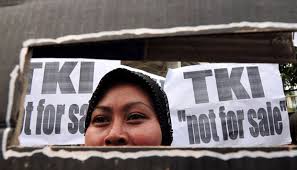




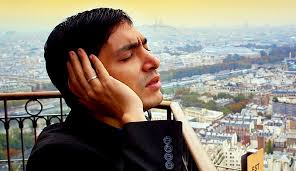






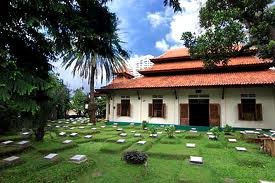

![Masjid Cut Mutiah is named after the name of the Acehnese heroine, which is the name of the street in Menteng, Central Jakarta. The building was initiated in 1922 as N.V. (Naamloze vennootschap) Bouwploeg, a Dutch property developer/architecture firm of Pieter Adriaan Jacobus Moojen (1879–1955). The firm planned and developed the nearby residential area of Gondangdia. Afterwards the building was used as the department for drinking water.[1] During the coming period, the building was used for different functions such as post office and train company office.[1] From 1959 until 1960 the building was used as a mayor office of Central Jakarta. Later the building was used as a drinking water department (Perusahaan Air Minum), Department of Residentials of Jakarta(Kantor Dinas Urusan Perumahan Jakarta), and People Assembly (MPRS). From 1964-1970, the building was used as the Office of Home and Religion (1964–1970). After Ali Sadikin's term as Governor of Jakarta, the building was converted into a provincial mosque on 18 August 1987 under the law SK gubernur no. 5184/198. (Wikipedia)](https://islaminindonesia.wordpress.com/wp-content/uploads/2013/11/masjid-cut-mutiah1.jpg?w=300&h=225)



